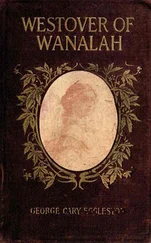"Here, get up. This thing must be attended to immediately. There are papers to be drawn and executed at once. So hustle into some clothes quick."
CHAPTER IX – THE COURAGE OF WOMANHOOD
When rumors came to The Oaks of Boyd Westover's trouble, Margaret Conway's first impulse was to drive over to Wanalah and comfort Boyd's mother with assurances that there could be no truth in the reports. Margaret had always cherished a very tender affection for Mrs. Westover, and during the brief time since her love had been pledged to Boyd, she had found that affection rapidly taking upon itself the character of a girl's tenderness for her mother. Having never known a mother of her own, the girl was quick to make herself a daughter in affection where she was presently to become a daughter in law and in fact. She drove every day to Wanalah and spent loving hours there with the gentle invalid who had so warmly welcomed her daughterly love.
But when the evil news of Boyd's conviction came and Margaret planned to go earlier than usual to Wanalah, Colonel Conway objected.
"You will only distress yourself and afflict her," he said. "This thing will be your only topic of conversation, and what can either of you say that will bring comfort to the other?"
"I can tell her I love her and that I loyally believe in Boyd," answered the girl with all the pride of her race in her voice and attitude.
"But how can you say that, daughter, in face of the evidence?"
"It isn't evidence—it's merely testimony. The evidence lies in Boyd Westover's character and it flatly contradicts the testimony. The testimony is false; the evidence is subject to no possible question. I'm sorry you don't see it so, Father."
The old man paced the floor for a space and then answered:
"Perhaps I do see it so. I'd like to, at any rate; I'm strongly disposed to give the young man the benefit of the doubt, but—"
"There isn't any doubt," interjected the passionate girl with vehemence. "There isn't any doubt, and I shall quarrel even with you, Father, if you suggest such a thing."
"Be calm, my child," pleaded the old man placatively. "Perhaps you are right. I'm disposed to take your view—strongly so. But there's your Aunt Betsy, you know."
"Yes, I know. She's the only human being you were ever afraid of, Father. But you're afraid of her as everybody else is—everybody but me. I don't know why."
"But your Aunt Betsy presents the matter in a way that must be considered. She says—"
"Oh, I know what she says," interrupted the overwrought girl. "She has said it all to me, over and over again. She urges the conventions—the cowardly shams and falsities of our artificial life. She talks of 'what people will say,' as if it made any difference what people say when we know we are doing right. You know that Boyd Westover is an honorable man, just as I know it. If you hadn't been afraid of Aunt Betsy, you'd have done your duty like a man; you'd have gone to Boyd's side. You'd have stood by him in his hour of need—"
"But, Margaret, what good would that have done in face of the evidence or the testimony, for I agree with you that there's a difference?"
"It would have strengthened and encouraged him with the assurance that one brave man at least knew his character and was ready to face calumny with an assertion of his confidence. But you were afraid of Aunt Betsy. It is the only cowardice I ever knew you to be guilty of. She talks of placing 'blots on our escutcheon'—as if we had an escutcheon, whatever that sort of thing may be; I tell you the worst blot of all was made by your failure to go to Richmond and stand by Boyd in his undeserved trouble. You played the part of a coward there. Pardon me if my words are harsh. I feel them and mean them. Now I am going to Wanalah. I, at least, will do my part as a descendant of a brave race, if all the demons of perdition stand in the way."
With that the girl moved proudly out of the house, mounted the horse that a negro held waiting for her, and rode away.
She did not return until after the funeral at Wanalah, which her father and her aunt attended, and when she returned, her attitude was one of stately reserve which appalled her father and "grieved" her aunt.
In the meanwhile she had written every day a loyal letter to Boyd Westover.
Not one of those letters ever reached him. Nor did any of his letters come to her. Aunt Betsy had deemed it her "duty to the family" to see to that, and Aunt Betsy prided herself upon doing her duty, no matter how disagreeable it might be—to others.
But the failure of the missives left Margaret in sorely distressing perplexity. Why did not Boyd write to her? Why did he not take her into his confidence? Especially why did he not respond, in some way, to her repeated avowals of splendid loyalty and confidence?
She could not understand. She could not even inquire. She could only mourn.
CHAPTER X – THE PACKET OF PAPERS
Jack Towns was accustomed to have about him whatever there was that could make his hard-working life comfortable, if any reasonable expenditure of money could secure it. And he interpreted the words "reasonable expenditure," in that connection, rather liberally. His income was large and he had nobody anywhere dependent upon him. Accordingly he was one of the two or three self-indulgent men in Richmond at that time, who possessed a set bath tub with water taps running into it and a showering apparatus above.
When he roused his friend that night, after hurriedly running through the packet of papers, he was full of an eagerness and enthusiasm which the other did not seem to share. Boyd Westover was sleepy, and worse still, in his present case, he was indifferent. What good could a packet of papers or anything else bring to a man disgraced, condemned, doomed to a life of lost repute? He heartily wished that Jack had kept the papers and done whatever he pleased with them after the closing of the prison doors behind himself on the approaching day. But in response to Jack's insistence, he arose, drew on a light dressing gown and slippers, and offered his dully uninterested presence in Jack's dining room. 4 Promptly recognizing his condition of mind, Jack took matters into his own hands, after a masterful habit he had. He seized Boyd by the elbow and led him into the bath room.
"There," he said; "lay off your gown and pull your toes out of those slippers. Hop into the tub and I'll wake you up."
At the next instant the cold shower descended upon the young man's head and person, and Jack continued his chatter.
"Now you're awake, rub yourself down and come into the dining room. I've got to have you awake and you and I are going to work all night. I've sent Dick for half a hundred oysters and a dozen bottles of cold ale, and later he'll make black coffee for us. Hurry up now, and 'do try to be interested' as a bashful friend of mine said to a girl when he was about to propose to her."
As he left the bath room abruptly, Boyd made no reply until he joined the lawyer in the dining room where the papers from the packet lay spread out in the order in which they were to be taken up for consideration. Then he said:
"I will try to be interested, Jack; for your sake I'll do my best. But what interest can a man in my position feel in anything?"
"Now listen to me, Boyd!" Jack Towns said commandingly, and rising to his feet to say it. "Listen to me. You are morbid. You need calomel or something. You're the victim of some mistake and you're in sore trouble. But you are not disgraced. Nobody can disgrace a man but the man himself. You are conscious of your own honor; what matters it what others think? Besides, no honest man in Virginia believes that you are guilty of a sneaking crime or capable of it. The jury that convicted you didn't believe it and not one of them believes it now. The Judge who will sentence you doesn't believe it. If the envious and malignant falsely pretend to believe it, why should you care for the despicable pretense of people so utterly unworthy? If cowards fight shy of your acquaintance, lest recognition of you should compromise themselves, why should you care for the acquaintance of such poltroons? You are Westover of Wanalah—inheritor of an honorable name. You will be that so long as you shall live. It behoves you to bear that name with head erect and with contempt alone for those who do not recognize your worthiness to bear it. This affair is an unfortunate incident. It will soon be over, and you will have a lifetime before you in which to teach men the falsity of the accusation against you. There. My lecture is done. Let us get to these papers. They hold great news for you."
Читать дальше












